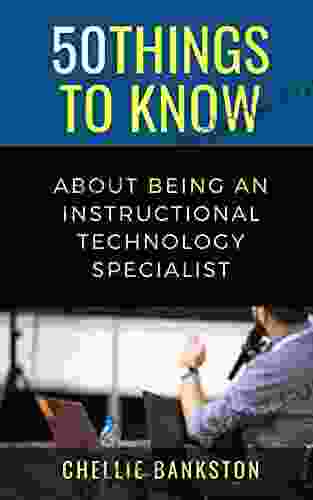50 Things To Know About Being An Instructional Technology Specialist

Instructional technology specialists are responsible for helping teachers integrate technology into their classrooms. They work with teachers to develop and implement lesson plans that use technology, and they provide training and support to teachers on how to use technology effectively.
4.6 out of 5
| Language | : | English |
| File size | : | 422 KB |
| Text-to-Speech | : | Enabled |
| Screen Reader | : | Supported |
| Enhanced typesetting | : | Enabled |
| Print length | : | 42 pages |
| Lending | : | Enabled |
Instructional technology specialists need to have a strong understanding of both technology and education. They need to be able to stay up-to-date on the latest educational technology trends, and they need to be able to communicate effectively with teachers and students.
If you're interested in a career as an instructional technology specialist, here are 50 things you should know:
- Instructional technology specialists need to have a strong understanding of both technology and education.
- They need to be able to stay up-to-date on the latest educational technology trends.
- They need to be able to communicate effectively with teachers and students.
- Instructional technology specialists work with teachers to develop and implement lesson plans that use technology.
- They provide training and support to teachers on how to use technology effectively.
- Instructional technology specialists can work in a variety of settings, including schools, colleges, and universities.
- They can also work for educational technology companies or as independent consultants.
- The job outlook for instructional technology specialists is expected to grow faster than average in the coming years.
- Instructional technology specialists can earn a median annual salary of $77,000.
- The top 10% of earners can earn more than $112,000 per year.
- Instructional technology specialists need to be able to work independently and as part of a team.
- They need to be able to manage their time effectively.
- They need to be able to solve problems and think critically.
- Instructional technology specialists need to be able to stay organized.
- They need to be able to pay attention to detail.
- Instructional technology specialists need to be able to work under pressure.
- They need to be able to adapt to change.
- Instructional technology specialists need to be able to work with people from all walks of life.
- They need to be able to build relationships with teachers, students, and parents.
- Instructional technology specialists need to be able to advocate for the use of technology in education.
- They need to be able to stay up-to-date on the latest research on educational technology.
- Instructional technology specialists need to be able to write and speak effectively.
- They need to be able to present information clearly and concisely.
- Instructional technology specialists need to be able to use technology to create and deliver presentations.
- They need to be able to use technology to manage projects.
- Instructional technology specialists need to be able to use technology to communicate with others.
- They need to be able to use technology to collaborate with others.
- Instructional technology specialists need to be able to use technology to solve problems.
- They need to be able to use technology to make decisions.
- Instructional technology specialists need to be able to use technology to create and implement lesson plans.
- They need to be able to use technology to assess student learning.
- Instructional technology specialists need to be able to use technology to provide professional development for teachers.
- They need to be able to use technology to support students with special needs.
- Instructional technology specialists need to be able to use technology to create and manage online learning environments.
- They need to be able to use technology to create and deliver online courses.
- Instructional technology specialists need to be able to use technology to assess student learning in online courses.
- They need to be able to use technology to provide technical support to teachers and students.
- Instructional technology specialists need to be able to use technology to troubleshoot problems.
- They need to be able to use technology to maintain technology equipment.
- Instructional technology specialists need to be able to use technology to develop and implement technology policies.
- They need to be able to use technology to evaluate the effectiveness of technology in education.
- Instructional technology specialists need to be able to use technology to advocate for the ethical use of technology in education.
If you're interested in a career as an instructional technology specialist, there are a number of resources available to help you get started.
- The International Society for Technology in Education (ISTE) offers a variety of resources for instructional technology specialists, including professional development, conferences, and publications.
- The National Educational Technology Standards (NETS) provide a framework for instructional technology specialists to use when developing and implementing technology-based instruction.
- The National Council for Accreditation of Teacher Education (NCATE) accredits teacher education programs that include a focus on instructional technology.
With the right education and experience, you can become an instructional technology specialist and help teachers use technology to improve student learning.
4.6 out of 5
| Language | : | English |
| File size | : | 422 KB |
| Text-to-Speech | : | Enabled |
| Screen Reader | : | Supported |
| Enhanced typesetting | : | Enabled |
| Print length | : | 42 pages |
| Lending | : | Enabled |
Do you want to contribute by writing guest posts on this blog?
Please contact us and send us a resume of previous articles that you have written.
 Best Book
Best Book Page Flip
Page Flip Bookshelf
Bookshelf Literary loom
Literary loom Chapter
Chapter Bookish
Bookish PageTurner
PageTurner Bibliophile
Bibliophile Story
Story Inkwell
Inkwell Bookworm
Bookworm Labyrinth
Labyrinth Plot Twist
Plot Twist Prose
Prose Paperback
Paperback Storyteller
Storyteller Sanctuary
Sanctuary Fiction
Fiction Reading
Reading Chronicle
Chronicle Read
Read Tarry Lindquist
Tarry Lindquist Dr Lucie Rivera
Dr Lucie Rivera Tyanna
Tyanna Sarah Jackson
Sarah Jackson Ava Archer
Ava Archer Motorcycle Vagabonds
Motorcycle Vagabonds Shea Ernshaw
Shea Ernshaw Sylvia Townsend Warner
Sylvia Townsend Warner Thomas J Campanella
Thomas J Campanella Leonard Barkan
Leonard Barkan James Grant
James Grant Jeanine Cornillot
Jeanine Cornillot Jay Brian Schoonmaker
Jay Brian Schoonmaker Robert B Pippin
Robert B Pippin Mel Dau
Mel Dau Lauren Bastide
Lauren Bastide Sarah Vowell
Sarah Vowell David Railton
David Railton Marcello Di Cintio
Marcello Di Cintio Thomas Lamosse
Thomas Lamosse Bianca Del Rio
Bianca Del Rio Linda Langner
Linda Langner John Tateishi
John Tateishi Terrance Zepke
Terrance Zepke Patrick Dennis
Patrick Dennis Kate Flint
Kate Flint Manny Serrato
Manny Serrato Karpov Kinrade
Karpov Kinrade Jose Vadi
Jose Vadi Vaneetha Risner
Vaneetha Risner Joyce Yee
Joyce Yee Mike Brooks
Mike Brooks Zack Meisel
Zack Meisel Jennifer Lynne Matthews Fairbanks
Jennifer Lynne Matthews Fairbanks Lali Duperti
Lali Duperti Kaitlyn Dornbier
Kaitlyn Dornbier Camilla Townsend
Camilla Townsend Interweave Editors
Interweave Editors Jean M Roberts
Jean M Roberts William Reyland
William Reyland Isak Dinesen
Isak Dinesen Elinor Lipman
Elinor Lipman Jeff Blumenfeld
Jeff Blumenfeld Sheila Simkin
Sheila Simkin James Huntington
James Huntington Jeff Shaara
Jeff Shaara Alec Potrero
Alec Potrero Jessica Shorstein
Jessica Shorstein Tom Segev
Tom Segev Robert Rosen
Robert Rosen Julian Curry
Julian Curry Jan Cohen Cruz
Jan Cohen Cruz Regine Abel
Regine Abel Natalie Livingstone
Natalie Livingstone K C Mills
K C Mills Jack Hitt
Jack Hitt Vicky Gray
Vicky Gray Annette Gisby
Annette Gisby Joe Garcia
Joe Garcia Shonda Buchanan
Shonda Buchanan Bonny Snowdon
Bonny Snowdon Sandra M Z Armstrong
Sandra M Z Armstrong Kristen Faber
Kristen Faber Kristal Wick
Kristal Wick Lauren Francis Sharma
Lauren Francis Sharma Sianne Ngai
Sianne Ngai Carlyn Beccia
Carlyn Beccia James Fairbairn
James Fairbairn S J A Turney
S J A Turney Marisa Renee Lee
Marisa Renee Lee Jason Kander
Jason Kander Irene Latham
Irene Latham Ivy Mix
Ivy Mix Stephen Smith
Stephen Smith Baby Professor
Baby Professor Supersummary
Supersummary Hattie Gossett
Hattie Gossett Hiroko Yoda
Hiroko Yoda Steve Charney
Steve Charney Pierre Pochet
Pierre Pochet J T Nicholas
J T Nicholas K Webster
K Webster John Kane
John Kane Margaret Hermes
Margaret Hermes Tim Testu
Tim Testu Jasmine Tritten Llc
Jasmine Tritten Llc Kai Kupferschmidt
Kai Kupferschmidt John Preston
John Preston Vera Nazarian
Vera Nazarian Paula M Block
Paula M Block Linda Lael Miller
Linda Lael Miller Ruth Behar
Ruth Behar Hourly History
Hourly History Ian Condry
Ian Condry Amanda Arneill
Amanda Arneill James Anthony
James Anthony Lee J Ames
Lee J Ames Henry Hemming
Henry Hemming Keith Fenwick
Keith Fenwick Shawn Levy
Shawn Levy Noa Baum
Noa Baum Jane Goodall
Jane Goodall Dorit Elisha
Dorit Elisha Kindle Edition
Kindle Edition Lorna Jane Harvey
Lorna Jane Harvey Eva Van Loon
Eva Van Loon John C Rigdon
John C Rigdon Second Edition Kindle Edition
Second Edition Kindle Edition Robert D Young
Robert D Young Yvonne Moore
Yvonne Moore Shirish Deshpande
Shirish Deshpande Michael Harkins
Michael Harkins Phil Chan
Phil Chan V F Gutierrez
V F Gutierrez Stephen Orr
Stephen Orr Travis Jeppesen
Travis Jeppesen Peter Parr
Peter Parr Zia Knight
Zia Knight Victoria Charles
Victoria Charles Laxuri Art
Laxuri Art E H Raskin
E H Raskin Ryan Leslie
Ryan Leslie Michael Curtis
Michael Curtis Megan Mackie
Megan Mackie Jessica Gadziala
Jessica Gadziala Jacquelyn Descanso
Jacquelyn Descanso Edoardo Albert
Edoardo Albert Bruce Cook
Bruce Cook Jonas Peters
Jonas Peters Sean Wallace
Sean Wallace Marion Zimmer Bradley
Marion Zimmer Bradley Thomas Weisser
Thomas Weisser E C Godhand
E C Godhand Tom Glover
Tom Glover Tim Jeal
Tim Jeal R G Richardson
R G Richardson Jeffrey B Perry
Jeffrey B Perry Karen Homer
Karen Homer Roxanne Modafferi
Roxanne Modafferi Steve Hulett
Steve Hulett Steph The Hammer Hammerman
Steph The Hammer Hammerman Veronica Li
Veronica Li Martin Gilbert
Martin Gilbert Mitchell Albala
Mitchell Albala Hilary Bradt
Hilary Bradt Taylor Moore
Taylor Moore Yuta Aoki
Yuta Aoki Roy John
Roy John James Claflin
James Claflin Ross Buzzell
Ross Buzzell Niqua Nakell
Niqua Nakell Jessica Alba
Jessica Alba Jaime Lowe
Jaime Lowe Kira Salak
Kira Salak Brad Goreski
Brad Goreski Stephen Hunter
Stephen Hunter Steve Stevenson
Steve Stevenson Patti Mollica
Patti Mollica Mary Taylor Simeti
Mary Taylor Simeti Nelson George
Nelson George Rolf Giesen
Rolf Giesen Jennifer L Scott
Jennifer L Scott Jack C Ramsay
Jack C Ramsay Suhas Mantri
Suhas Mantri James Halliday
James Halliday Rosie Rivera
Rosie Rivera J D Sullivan
J D Sullivan D K Holmberg
D K Holmberg John Szpunar
John Szpunar Tanav Patkar
Tanav Patkar Laura Slater
Laura Slater James Barrington
James Barrington Louis L Amour
Louis L Amour Jerry Vermilye
Jerry Vermilye Vincent Miller
Vincent Miller Kenneth French
Kenneth French Ian Blakemore
Ian Blakemore Jean Muenchrath
Jean Muenchrath Neal Stephenson
Neal Stephenson Ted Chiang
Ted Chiang Christina Sharpe
Christina Sharpe Laura Beth Love
Laura Beth Love Ryan Jennings
Ryan Jennings Stefan Kottwitz
Stefan Kottwitz Lisa Kleypas
Lisa Kleypas Judy Gay Matthews
Judy Gay Matthews Luis J Rodriguez
Luis J Rodriguez Jeff Mellem
Jeff Mellem Julia Rothman
Julia Rothman Jeff Vandermeer
Jeff Vandermeer Steve Berry
Steve Berry Steve Parker
Steve Parker Joshua T Calvert
Joshua T Calvert Jeffery J Dyas
Jeffery J Dyas Joy Avery
Joy Avery Sally R Ball
Sally R Ball Mira Schor
Mira Schor David Menconi
David Menconi Stephen L Carter
Stephen L Carter Paul Arthur Berkman
Paul Arthur Berkman J Nichole
J Nichole Jeff Rovin
Jeff Rovin Roland Kelts
Roland Kelts Ishmael Beah
Ishmael Beah Leslie Marmon Silko
Leslie Marmon Silko William Gray
William Gray Ilene Strizver
Ilene Strizver Mary Anne Dorward
Mary Anne Dorward Matt Zoller Seitz
Matt Zoller Seitz Una Mccormack
Una Mccormack Susan Hable
Susan Hable Melanie Clarke
Melanie Clarke W Kamau Bell
W Kamau Bell J R Ward
J R Ward Kiyoshi Takahashi
Kiyoshi Takahashi Bob Wilbanks
Bob Wilbanks John R Kemp
John R Kemp Jasper T Scott
Jasper T Scott Judy Friesem
Judy Friesem Languages World
Languages World June Mcleod
June Mcleod Kim Dana Kupperman
Kim Dana Kupperman Zogarth
Zogarth Jelani Cobb
Jelani Cobb Howard W French
Howard W French Waheed Arian
Waheed Arian Katherine Arden
Katherine Arden Paul Carter
Paul Carter Janet Carlson
Janet Carlson Martina M Lanier
Martina M Lanier Reymundo Sanchez
Reymundo Sanchez Kevin Budelmann
Kevin Budelmann Obaidur Rahaman
Obaidur Rahaman Jonathan Dehart
Jonathan Dehart Marjorie R Williams
Marjorie R Williams James Patterson
James Patterson Hilary Wilson
Hilary Wilson Michael Hone
Michael Hone Melissa Washburn
Melissa Washburn James Swallow
James Swallow Phoebe Hoban
Phoebe Hoban Walter Mosley
Walter Mosley Robert Mccammon
Robert Mccammon Thefirstdefier
Thefirstdefier Katharine Branning
Katharine Branning Ramie Targoff
Ramie Targoff Jana K Lipman
Jana K Lipman Rick Scott
Rick Scott Jack London
Jack London Sanford Meisner
Sanford Meisner Tade Thompson
Tade Thompson Manoah Bowman
Manoah Bowman Ping Fu
Ping Fu Jim Marrs
Jim Marrs Martha Maccallum
Martha Maccallum Henry David Thoreau
Henry David Thoreau Mark Rothko
Mark Rothko Butch Hartman
Butch Hartman J D Robb
J D Robb Tiffany Haddish
Tiffany Haddish Justin Sloan
Justin Sloan Martin Pistorius
Martin Pistorius Jazz E
Jazz E Marcus Samuelsson
Marcus Samuelsson Misty Copeland
Misty Copeland P Scott Cunningham
P Scott Cunningham Iris Bolling
Iris Bolling Maria Adolfsson
Maria Adolfsson James J Downes
James J Downes Ben Shahn
Ben Shahn Jason Fry
Jason Fry Robert C Wood
Robert C Wood Travis Rieder
Travis Rieder Pat Kramer
Pat Kramer Stephanie Nicole Norris
Stephanie Nicole Norris Samantha Irby
Samantha Irby Todd Wassel
Todd Wassel Ja Huss
Ja Huss Michael Dooley
Michael Dooley J Foord
J Foord Henry B Culver
Henry B Culver Mike Downs
Mike Downs Sherelle Green
Sherelle Green Susan Nagel
Susan Nagel Volta Voloshin Smith
Volta Voloshin Smith Ramez Naam
Ramez Naam Jean Johnson
Jean Johnson Jd Chandler
Jd Chandler Nora Ephron
Nora Ephron Eric Vall
Eric Vall Larry Loftis
Larry Loftis Keith Osborn
Keith Osborn Justin M Monehen
Justin M Monehen Lisa Edwards
Lisa Edwards Stephen T Moskey
Stephen T Moskey Richard Lecocq
Richard Lecocq Deborah Frisch
Deborah Frisch Lina Acevedo
Lina Acevedo Karen Lindeman
Karen Lindeman Steve Spill
Steve Spill Zuri Day
Zuri Day Tasha Black
Tasha Black John Potvin
John Potvin Kevin Ikenberry
Kevin Ikenberry C J Cherryh
C J Cherryh Brandon Taylor
Brandon Taylor Nat Segnit
Nat Segnit Kyle Anthony
Kyle Anthony Stuart Woods
Stuart Woods Henry Fraser
Henry Fraser Julia Fowler
Julia Fowler Merry White
Merry White Laureen Nussbaum
Laureen Nussbaum Peter F Stevens
Peter F Stevens Mauricio Savarese
Mauricio Savarese Joscha Remus
Joscha Remus Slim Dusty
Slim Dusty Sonia Sotomayor
Sonia Sotomayor Jeremy Black
Jeremy Black Yvonne Claypole
Yvonne Claypole Kate Rawles
Kate Rawles Lawrence Durrell
Lawrence Durrell R Brady Frost
R Brady Frost Janet Adler
Janet Adler Rob Wareing
Rob Wareing Jim Forest
Jim Forest Rani St Pucchi
Rani St Pucchi Martin Ursell
Martin Ursell Quentin Tarantino
Quentin Tarantino John Berger
John Berger Kandra Churchwell
Kandra Churchwell Jan Wahl
Jan Wahl Ilana Kurshan
Ilana Kurshan Traci Bunkers
Traci Bunkers Michelle Rial
Michelle Rial Jimmy O Yang
Jimmy O Yang P J Thorndyke
P J Thorndyke Jonathan Drori
Jonathan Drori Isaac Asimov
Isaac Asimov Kaoru Nonomura
Kaoru Nonomura Mariam V Lawal
Mariam V Lawal Dean Dalton
Dean Dalton Stephen Kurkjian
Stephen Kurkjian Ryan Dunlavey
Ryan Dunlavey Harold Speed
Harold Speed Laurie Tom
Laurie Tom Kia Jones
Kia Jones James Joseph
James Joseph Lisa Wixon
Lisa Wixon Marc Dipaolo
Marc Dipaolo Jonathan Jones
Jonathan Jones Melissa Fehr
Melissa Fehr Sarah Simon
Sarah Simon Julia L Foulkes
Julia L Foulkes M D Cooper
M D Cooper Michael Moorcock
Michael Moorcock Kat Varano
Kat Varano Tina Turner
Tina Turner Shirtaloon
Shirtaloon Insight Guides
Insight Guides Robyn Carr
Robyn Carr Susan Zwerman
Susan Zwerman Viet Thanh Nguyen
Viet Thanh Nguyen Carol Miller
Carol Miller Paul Bonnet
Paul Bonnet Kevin Hart
Kevin Hart Susan Kesler Simpson
Susan Kesler Simpson Danielle Joseph
Danielle Joseph Sam Pivnik
Sam Pivnik Jesmyn Ward
Jesmyn Ward Jim Mccarthy
Jim Mccarthy William L Iggiagruk Hensley
William L Iggiagruk Hensley James Graham Baker
James Graham Baker Jeff Hobbs
Jeff Hobbs Lynn H Nicholas
Lynn H Nicholas J A Hinds
J A Hinds Jason Kingsley
Jason Kingsley Matthew Israel
Matthew Israel Pete Salgado
Pete Salgado Chris Kennedy
Chris Kennedy Jason L Riley
Jason L Riley Steven Konkoly
Steven Konkoly Jack Campbell
Jack Campbell Nobuko Miyamoto
Nobuko Miyamoto Marty Sklar
Marty Sklar Nancy Ditomaso
Nancy Ditomaso Peter Watts
Peter Watts Karen Attman
Karen Attman Jo Goodman
Jo Goodman Susie Hodge
Susie Hodge Lizzie Damilola Blackburn
Lizzie Damilola Blackburn John Pike
John Pike John Scotney
John Scotney J L Heilbron
J L Heilbron Fran Macilvey
Fran Macilvey Russell Smith
Russell Smith Jason Cochran
Jason Cochran Phillip Barlag
Phillip Barlag Darby Penney
Darby Penney Tom Bancroft
Tom Bancroft Zanna Goldhawk
Zanna Goldhawk Meredith Talusan
Meredith Talusan Maureen T Corrigan
Maureen T Corrigan Nancy Mitford
Nancy Mitford Kent Blansett
Kent Blansett Mary Turzillo
Mary Turzillo Konchog Lhadrepa
Konchog Lhadrepa Kay Doherty Bennett
Kay Doherty Bennett Jim Hutchinson
Jim Hutchinson Weston Ochse
Weston Ochse Melissa Maerz
Melissa Maerz Bruce Hanington
Bruce Hanington Steve Kaffen
Steve Kaffen Ian Littlewood
Ian Littlewood James E Seaver
James E Seaver Marilyn Laura Bowman
Marilyn Laura Bowman J J Mcavoy
J J Mcavoy Michael Roberts
Michael Roberts Tricia Cornell
Tricia Cornell Jodi Ellen Malpas
Jodi Ellen Malpas Michael Peter Bolus
Michael Peter Bolus Northrop Davis
Northrop Davis Johno Ellison
Johno Ellison Joshua Glenn
Joshua Glenn Ariel Sabar
Ariel Sabar Theodore Menten
Theodore Menten James Robert Parish
James Robert Parish Karen Hull
Karen Hull Xueting Christine Ni
Xueting Christine Ni Shi Davidi
Shi Davidi Mary Antin
Mary Antin James Hall
James Hall Juliette Aristides
Juliette Aristides Mark Griffin
Mark Griffin Uri Mcmillan
Uri Mcmillan Henri Piquer
Henri Piquer William Gibson
William Gibson Jansen Art Studio
Jansen Art Studio Loet Velmans
Loet Velmans Jeneane Lunn
Jeneane Lunn Tom Swimm
Tom Swimm Tanya Tagaq
Tanya Tagaq Ron Collins
Ron Collins Will Castro
Will Castro Mary Heron Dyer
Mary Heron Dyer Isabel Santos
Isabel Santos Jeanne St James
Jeanne St James Mary Jordan
Mary Jordan Lonely Planet
Lonely Planet Sonya Lajuan
Sonya Lajuan Ida B Wells
Ida B Wells Philip Gourevitch
Philip Gourevitch Rudolf Koch
Rudolf Koch Jean Hugard
Jean Hugard Marc Foster
Marc Foster Steven W Brallier
Steven W Brallier John Guy
John Guy Nancy Marie Mithlo
Nancy Marie Mithlo John Armstrong
John Armstrong John Clifford
John Clifford James H Cobb
James H Cobb Jerry Saltz
Jerry Saltz Roy Liebman
Roy Liebman Patrick Dimarchi
Patrick Dimarchi Suzanne Brooker
Suzanne Brooker Jason Cranford Teague
Jason Cranford Teague Julia Zarankin
Julia Zarankin James Monaco
James Monaco Nana Kwame Adjei Brenyah
Nana Kwame Adjei Brenyah Paul Gauguin
Paul Gauguin Monica Byrne
Monica Byrne Kris Schnee
Kris Schnee David Sherwin
David Sherwin Katrina Rodabaugh
Katrina Rodabaugh Jean Paul Labourdette
Jean Paul Labourdette T O Smith
T O Smith Kimberly Wilkes
Kimberly Wilkes Kathryn Warner
Kathryn Warner John Joseph Adams
John Joseph Adams Jon Steel
Jon Steel Karin Evans
Karin Evans Washington Irving
Washington Irving Arthur Miller
Arthur Miller Lally Brown
Lally Brown Patricia Sands
Patricia Sands Tim Fisher
Tim Fisher Brian Trent
Brian Trent Renae Anderson
Renae Anderson Stefhen F D Bryan
Stefhen F D Bryan David Lynch
David Lynch Tom Dunkel
Tom Dunkel Richard R Brettell
Richard R Brettell Jason Waguespack
Jason Waguespack Tessa Fontaine
Tessa Fontaine Michael Head
Michael Head Susan Cross
Susan Cross Andrew Loomis
Andrew Loomis Ulrike Fuchs
Ulrike Fuchs Nolan Clark
Nolan Clark John Wilkinson
John Wilkinson Charles E Gannon
Charles E Gannon Victoria Lewis
Victoria Lewis Marcy Conway
Marcy Conway Jacqueline Winspear
Jacqueline Winspear John Lawson
John Lawson Karen Stocker
Karen Stocker Maeve Binchy
Maeve Binchy Mimi Thorisson
Mimi Thorisson Willie Mays
Willie Mays Theo Farrington
Theo Farrington Slim Randles
Slim Randles Morris Rossabi
Morris Rossabi Marian Lindberg
Marian Lindberg John Hindmarsh
John Hindmarsh Honey Phillips
Honey Phillips Jacquie Abram
Jacquie Abram M William Phelps
M William Phelps Wayne J Lutz
Wayne J Lutz Joe Posnanski
Joe Posnanski Kim Fairley
Kim Fairley Jeff Howard
Jeff Howard Ronald Bergan
Ronald Bergan James Hunter
James Hunter E M Hardy
E M Hardy Tom Santopietro
Tom Santopietro Joshua Dalzelle
Joshua Dalzelle Stef Smulders
Stef Smulders Ran Walker
Ran Walker Joan Mellen
Joan Mellen Seth Rain
Seth Rain Michael Kluckner
Michael Kluckner Plutarch
Plutarch Italo Calvino
Italo Calvino Roger Ebert
Roger Ebert Joe Fig
Joe Fig John Man
John Man Valerie Wilson Wesley
Valerie Wilson Wesley Iain Rob Wright
Iain Rob Wright Karen Cheng
Karen Cheng Ruth Superhal
Ruth Superhal Kathryn Stockett
Kathryn Stockett Philip Gwynne Jones
Philip Gwynne Jones Larry Niven
Larry Niven James Baldwin
James Baldwin Parnaz Foroutan
Parnaz Foroutan Norman Eisen
Norman Eisen Kresley Cole
Kresley Cole Damon Tweedy
Damon Tweedy Hillary S Webb
Hillary S Webb Jodi Thomas
Jodi Thomas Maitland Mcdonagh
Maitland Mcdonagh James Lawson
James Lawson J Nell
J Nell Vaughn Patillo
Vaughn Patillo Mark Willenbrink
Mark Willenbrink Richard Blanco
Richard Blanco Robin Hobb
Robin Hobb Nicholas Sammond
Nicholas Sammond Isabel Wroth
Isabel Wroth Johanna Lindsey
Johanna Lindsey Laylah Roberts
Laylah Roberts Reid Mitenbuler
Reid Mitenbuler Jennifer Campbell
Jennifer Campbell Scott Pratt
Scott Pratt Patti M Hall
Patti M Hall James R Rush
James R Rush Jami Gigot
Jami Gigot Marjorie Agosin
Marjorie Agosin Pilar M Herr
Pilar M Herr Roger Zelazny
Roger Zelazny Vikki Haffenden
Vikki Haffenden Helena Reckitt
Helena Reckitt Joe Haldeman
Joe Haldeman
Light bulbAdvertise smarter! Our strategic ad space ensures maximum exposure. Reserve your spot today!

 Jonathan HayesThe Life and Adventures of Quaker Among the Indians: A Captivating Tale of...
Jonathan HayesThe Life and Adventures of Quaker Among the Indians: A Captivating Tale of...
 Dylan MitchellImmerse Yourself in the Epic Novel: Unveiling the Civil War's Unfolding Drama
Dylan MitchellImmerse Yourself in the Epic Novel: Unveiling the Civil War's Unfolding Drama Justin BellFollow ·3.4k
Justin BellFollow ·3.4k Jeffery BellFollow ·6.9k
Jeffery BellFollow ·6.9k Chuck MitchellFollow ·16.2k
Chuck MitchellFollow ·16.2k Ian MitchellFollow ·17.1k
Ian MitchellFollow ·17.1k Allen ParkerFollow ·9.4k
Allen ParkerFollow ·9.4k Ralph Waldo EmersonFollow ·11.6k
Ralph Waldo EmersonFollow ·11.6k Dan BrownFollow ·8.4k
Dan BrownFollow ·8.4k Anton FosterFollow ·9k
Anton FosterFollow ·9k

 Holden Bell
Holden BellFriend Indeed One: A Comprehensive Guide to the Essential...
In the tapestry of human existence,...

 Gustavo Cox
Gustavo CoxBend Not Break: Life in Two Worlds
In the tapestry of human...

 Andy Hayes
Andy HayesDiscover How To Create Stunning Images With Useful And...
Drawing is a great way to...

 Aleksandr Pushkin
Aleksandr PushkinThe Rise and Fall of Latin Queen: An Exploration into the...
Latin music has captivated audiences...

 Ira Cox
Ira CoxUnveiling the Soul of Desert Painting: A Journey into the...
In the vast...
4.6 out of 5
| Language | : | English |
| File size | : | 422 KB |
| Text-to-Speech | : | Enabled |
| Screen Reader | : | Supported |
| Enhanced typesetting | : | Enabled |
| Print length | : | 42 pages |
| Lending | : | Enabled |










